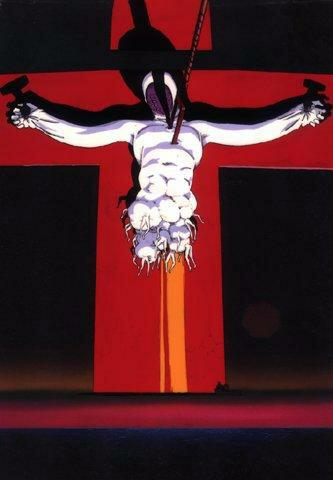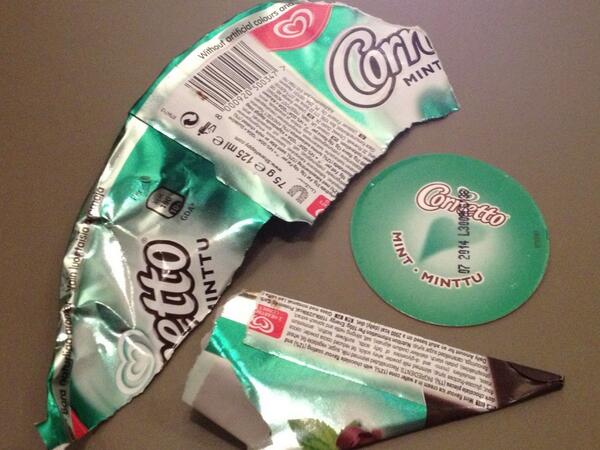I admittedly haven't seen much anime - that is the
whole point of these blogs, after all - but, even so, there are certain repeating ideas that even I can't help noticing crop up again and again. In the handful of sci-fi I've seen, for instance, the world has almost always been ravaged by some ill-defined catastrophe in the recent past. A world-changing disaster that everyone knows about but never really talks about. If I had a better grasp of Japanese culture I might be more confident saying why - but it seems likely that, like Godzilla, this is an echo of the atom bomb.
Mentioning only stuff I've seen and remembered (which isn't much)
Akira had the Akira Incident,
Nadesico had the Jovian War, and
last episode's
Cowboy Bebop had something called the Astral Gate Accident. In
Evangelion (or
Neon Genesis Evangelion to give it its full, meaningless nonsense title) something terrible happened fifteen years before the series - an event called "Second Impact" - which irreparably altered the lives of everyone on Earth.
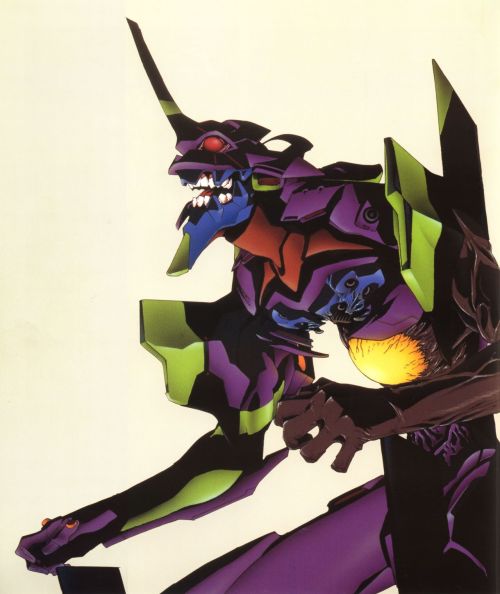
All of these apocalyptic events are kept ambiguous and vague - we know only that they happened and that they were very bad - but where
Akira is ambiguous because no-one really knows what happened,
Bebop is vague because the Accident doesn't actually affect the story, and
Nadesico is secretive because the details of the War are being actively covered up,
Evangelion withholds everything about Second Impact
just for the sake of being withholding! Everything that happens in the show is a direct consequence of that event - it informs every facet of this world and its characters - yet we're never told, even in broad terms, what it actually was.
That's one of
Evangelion's two main problems in a nutshell. Nothing is ever clearly explained at any point. Ambiguity is fine in small doses, but when every single thing is kept uncertain and unclear, nothing ever means
anything. Naturally this is less of a problem at the start of the series than the end - as the early mysteries seem as though they might lead somewhere, and maybe even have solutions that make sense. But no, when we reach the big expository reveal scenes later on, they're just as ambiguous as the questions they attempt to answer.
Take a scene near the end of the series, for example, where we discover that one of the characters is a clone (which we'd already guessed anyway). We end up in a laboratory full of identical girls floating in tanks, all dead-eyed and unmoving. These are empty human husks, we are told, that contain no soul. Now, the specifics are about as clear as mud, but I think the clone we know as a character
does have a soul - I'm pretty sure it's the soul of the main character's dead mother, or possibly a
clone of that soul, but that doesn't make any sense and how did they get hold of a dead woman's soul either way? It's possible the clone girls may actually be
bodily clones of the mother, too, but that's somehow even less clear.
While a bit confusing, it's at least semi-coherent - but then it plunges into the abyss. We're told that these clones are secretly being used as autopilots, even though they're just lifeless shells, and even though the autopilots we've seen in action were psychotic automated murder-bots. This is presented as the shocking answer to the big autopilot mystery (one character almost says exactly that), but I didn't realise the autopilot was ever a mystery in the first place (I assumed it was just that - an autopilot) and, even if it was a mystery, this solution solves absolutely nothing and just makes the already mega-confusing mythology even more murky and incoherent! When the series is over, we understand far far
less than we ever did before.
It's the
same mistake Prometheus makes: not explaining everything is not the same as never explaining
anything. A few mysteries, like the exact origins and motives of the monstrous Angels, can actually benefit from ambiguity - but there's no benefit to being equally vague about important central story questions like, say, what the hell
are the goddamn Evangelions, anyway? I read online that they might be yet more clones of Shinji's mother and, if that is the case, then I really have no idea what this show is even about.
So what
is it about?
Xenon Genesis Evangelion is about a teenage boy called Shinji Ikari who, after receiving a message from his long estranged father, goes to meet him for the first time in years. He arrives just as a giant monster attacks the city, and it turns out his father doesn't want to talk or reconnect - he just needs Shinji to pilot a giant robot for him. Because, naturally, only certain teenagers have the ability to synchronise with these mechs. Shinji's understandably reluctant and more than a little unhappy with his dad (there's screaming and tears), but eventually he goes along with it and somehow beats the monster attacking the city - albeit getting his robot torn to pieces in the process. Shinji agrees to keep piloting, despite
utterly hating the experience, and from here we meet the various other pilots, scientists and soldiers that make up the anti-monster military agency NERV.
Simple as that sounds, we're actually hammered with mythology and mysteries from the very beginning. The robot in question is an Evangelion (or Eva), which is definitely part-organic and quite possibly alive; the monster is an Angel - one of several unearthly attackers prophesised by the Dead Sea Scrolls; NERV is controlled by some shadowy organisation called SEELE, who pretty clearly have an ulterior motive for all this; and there's something very fishy about the ethereal Rei Ayanami, NERV's other Eva pilot (spoiler: she's a clone).
On top of that plot-relevant stuff, there's also a whole host of Christian imagery and references used - from the names of NERV's three supercomputers (Casper, Melchior and Balthasar) to the Angel exploding in a cross-shaped beam of light when it's killed.
At first, that Christian stuff just seems to be decorative - adding some interesting flavour to this world and its imagery - but as the series progresses, we find that it goes
much deeper than that.
The first clue, seen above, is an off-hand mention of the Dead Sea Scrolls. This is a science-fiction mecha show where the soldiers and scientists are getting their information from a two-and-a-half-thousand-year-old real-world religious text.
That's... odd. It gets odder still when we learn later that SEELE's entire shady gameplan is to doggedly following the Scrolls to the letter, for no readily apparent reason.
Things finally go from odd to
batshit when Shinji's commander - a woman called Misato Katsuragi - takes him into NERV's cavernous basement and shows him a giant blobby monster-thing that they keep down there
nailed to a cross. This is an ancient and powerful being called Lilith - the first wife of Adam in
real-life Biblical myth (Lilith was created equal to Adam and refused to do his bidding, so God replaced her with the inferior and subservient Eve). Lilith and Adam (another giant monstery thing) are important because they're somehow involved in the unclear events of First and Second Impact (
First Impact being a similar event that happened millions of years ago and kickstarted life on Earth... I think). It seems like this stuff is common knowledge, too, because Shinji doesn't freak out or ask any questions about the insane things he's being shown.
A big problem with all this is that we have no idea how literal
Evangelion is being. Sometimes people in the show talk about this stuff like it's a metaphor - like Lilith and Adam are our genetic ancestors in an evolutionary sense - and other times it sounds entirely literal - like they are
literally the direct progenitors of the human race. We learn later on that the Angels are God's various prototypes for humans, before He settled on our own tiny, weak, fleshy design. I can only assume that's meant exactly as it sounds, because I have no idea how
else it could be meant. This is a cartoon where people are following the literal instructions of Biblical texts, yet the same people have developed a very non-religious, scientific definition of the soul.
Souls, by the way, are
incredibly important to every aspect of this mythology, and are the most inadequately explained aspect of the whole mess.
Getting back to the story, Misato explains that the Angels are attacking in an attempt to reach Lilith and that, if they ever succeeded, doing so would cause the hypothetical Third Impact, which would be much bigger than Second Impact, but probably still just as ambiguous and unclear.
What's weird is that when SEELE's sinister motives are finally revealed, their endgame is
also to cause Third Impact - beginning something called the Human Instrumentality Project, which will bring about "the next stage in human evolution" (a phrase which always makes my brain bleed). Why did they pour their worldwide resources into stopping the Angels if they ultimately wanted the same thing? Well, because the Dead Sea Scrolls told them to, probably. Those guys seriously have no motive beyond fulfilling ancient prophecies.
It's ok, though, because Gendo Ikari, Shinji's absent father and leader of NERV, knows what SEELE are up to and has no intention of letting them get away with it. It turns out he had his own secret plan all along: to initiate Human Instrumentality by causing Third Impact!
Wait...
All three major factions in this programme want the same thing - namely
the end of the world. It's possible that it will happen in slightly different ways depending on which party actually succeeds, but it's still pretty damn hard to root for anyone when the thing they're fighting over is who gets to press the big red apocalypse button.
The answer to this should be obvious. If we can't root for NERV or SEELE or the Angels, then we should be rooting for Shinji and Misato and the other characters who are just doing their jobs and fighting monsters and
aren't trying to bring about the end of the world. But that brings us to the second major problem with
Argon Genesis Evangelion: there really
aren't any characters. What there are instead is cardboard cutouts defined by one trait and one trait alone, who never progress or change or learn anything.

Shinji is scared of everything - Angels, responsibility, death, change - but mainly he's afraid of human interaction. Gendo loves his dead wife and feels nothing else, which is why he doesn't care about his son and why he's only nice to Rei who is carrying his wife's soul (probably). Misato is good at her job and bad at her life, with problems in all her personal relationships. Rei is an
actual cardboard cutout, with seemingly no emotions or personality - a hollow, empty robot, despite being the only clone with a soul.
That's it! You now know everything there is to know, in the entire series, about every one of those characters.
The only others in the show are the third and final Eva pilot - a German girl with the very German-sounding name of Asuka Soryu - and NERV's head scientist - a woman I neither know the name of nor care enough to find out. These two are unusual in that they almost have character arcs - but really they are just as paper-thin as the others; it only
looks like an arc because they hide their one-note personalities behind a mask of cocky overconfidence and scientific detachment respectively. In Asuka's case (it's pronounced "Oscar") this psychological armour falls away slowly over the series, revealing a little girl who is, if anything, even more terrified of life than Shinji. The scientist just seems to be a bit cold until, near the end, it's suddenly revealed out of nowhere that she's (a) sleeping with and possibly in love with Gendo and (b) stressed, depressed, violent, suicidal and crazy. These two are still shallow, unchanging characters - they just pretend to be
different shallow, unchanging characters for a while.
It's been
proven already this year that you don't need particularly deep or complex characters to make an awesome giant robot story.
Pacific Rim doesn't really have much in the way of character
arcs either - the archetypal characters simply do their thing - but it differs from
Evangelion in two major respects.
Firstly, the characters are
relatable. It's important to realise that isn't the same as "likable" - it just means that we can understand their mindset and why they act the way they do. Shinji, at first, is a highly relatable character. He has issues with his parents (don't we all?) and he's flung into a terrifying situation that he doesn't understand and is told he must do something he doesn't know how to do. For the first few episodes, we are very much on Shinji's side, because we understand exactly how he feels, and we’re interested in watching him rise to the challenge and seeing what kind of character he will become. But he never rises. He just wallows in self-pity and stagnates. He passively goes along with whatever he's told, and then cries about it later. We don't understand what he wants or feels anymore - he never rises
to the challenge, but he never rebels
against it either. He doesn't act like we would or like anyone we have ever met would. We can't relate to this guy
at all beyond those first few episodes and, after that, he mainly just
frustrates us as viewers. I was shouting at the screen more than a few times as I was forced to watch Shinji struggle again and again with
not making any choices.
I hated him, by the end. I really really hated the main character and his total lack of agency. I didn't understand him or anything he did or (more frequently) didn't do. It's
awful. All of the characters are awful, in fact. I couldn't stand any of them, because their motivations are never relatable at all - I couldn’t understand why anyone did what they did or made the choices they made. Looking back at the list above, the only ones that
resemble real people are Misato and maybe Asuka - and Asuka frustrates us anyway because she just slowly turns into Shinji.
The
second difference here is that
Pacific Rim knows that its characters, while relatable, are shallow and silly. It doesn't dwell on them beyond a few basic flashback scenes. It tells us who they are, then it gets on with the story.
Evangelion, on the other hand, seems to think its characters are incredibly deep and worthy of extra exploration. We spend what feels like forever psychoanalysing Shinji - literally, with him sat talking about himself to unseen observers - even though his psyche is about as deep as a puddle.
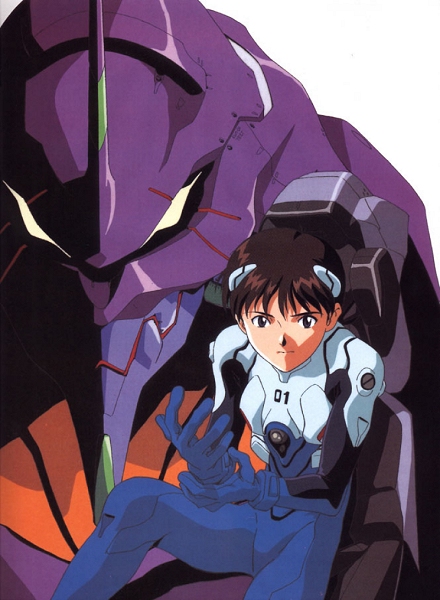
Shinji is scared of rejection, so he closes himself off from people, which makes people reject him, which makes him even more scared, which drives him even further into himself until he is insufferably insular and passive. That's it - that's all there is to Shinji Ikari - and every single viewer has worked that out by this point. It's not hard. We worked it out, funnily enough, by observing his decisions and interactions with the people around him - which is traditionally how you're
supposed to explore character in narrative fiction. If you have to spend an entire episode inside a character's head, monologuing about their own personality, then you are doing it wrong. If you have to spend
four or five episodes doing that, with a character that can be decisively summed-up in one sentence, then you probably shouldn't be writing stories in the first place. Shinji just repeats that single motivation (or
demotivation, since it drives him to indifference and inaction) over and over again. There's an episode somewhere near the midpoint where he synchronises so perfectly with his mech that he physically becomes one with it - melting into a liquid in his pilot-seat (don't worry, he gets better). While he's dissolved into his Eva, his consciousness (soul?) goes on a voyage of self-discovery - which means we get to see how many different ways the writers could come up with to keep repeating the same thing. One way they found to keep it interesting is to have him talk over erotic dream images of the female cast, including the infantile clone of his own mother - so we do learn that he objectifies women, which I suppose is
something we didn't know before. But that's about it.
When this godawful introspection is over, he seems to maybe have learned something from it. His body reforms itself when his soul comes to some kind of conclusion, so it looks almost like character growth. But in the next episode we're straight back to the same, inexplicably hopeless Shinji - and we're straight back to wanting to cave in his head with a brick. For me, this was the final nail in the coffin of the show's credibility. Which is probably for the best, because it meant I wasn't expecting much in the way of an ending.
At the end of the series, after NERV beat the final Angel - a white-haired anime girly-man with whom Shinji has a homoerotic friendship (obviously) - the studio ran out of either time, money, or both. There was no way they could patch together a satisfying ending (or any other kind of ending) so they didn't even try. The last two episodes, instead, are a bunch of floaty images on white backgrounds while Shinji talks about his issues. Or, rather, his
one issue. Again. And again. And again.
This is actually painful at this point. We can't take any more - so two whole episodes of it feels like torture. Or maybe punishment for our sins - the show is certainly big on that Wrath of God stuff! There's a weird bit where we see the characters in some kind of school-comedy version of the show, where Shinji sees what his life would be like without the Evas, but I don't even remember what we learned from it and I certainly didn't care. I just wanted this stupid nonsense to be
over.
The abstract weirdness of these two episodes isn't actually as out of place as it sounds, since the programme has been getting weirder and weirder for quite some time. It's implied (though I don't remember exactly how) that what we are watching is the Human Instrumentality Project in action - that, after the last Angel, SEELE caused Third Impact, and this is Shinji's introduction to their brave new world. Eventually, when the end finally, mercifully comes, Shinji meets up with everyone he's ever known - alive or dead - on a blue asteroid floating in the whiteness. They applaud and welcome him with open arms - Gendo even smiles. It's all very lovely and symbolic. And, because Second Impact, Third Impact, and Human Instrumentality were never properly explained or defined, none of it means a damn thing.
Brightly-Coloured Genesis Evangelion is, more than anything else, a hellishly frustrating experience. It has such obvious and wonderful potential which it never even comes close to paying off. It begins so strong - with characters we think we understand and relate to, interesting themes and symbolism, intriguing concepts and mysteries, and hints of a deep, complex mythology - and then it squanders every single one of those things by never advancing them further than those initial ideas. The characters don't progress, the themes don't lead anywhere, the mysteries don't get solved, and the mythology never makes any sense at all. At the start I really thought it was going to work; at the end I don't think it worked on
any level.
It’s also not done me any good in terms of opening up to Japanese animation. I watched this show at university because people kept saying it might change my mind, but it actually just reinforced every half-baked prejudice I had. This is a giant robot show where the main characters go to a sailor-suited school together and the hapless male character is surrounded by a harem of fetishised women. Much as I love giant robots, that's three eye-rolling anime clichés right there in the concept.

On top of that, the production values and animation fluctuate wildly, which is another thing that always annoys me about anime. It has great, dynamic fights - but these become fewer and shorter as time goes on, and they're punctuated by standing and talking scenes where no-one moves for minutes at a time. Gendo almost always sits with his fingers arched in front of his face, which means they couldn't even be bothered to
animate his mouth. Whenever he talks we're basically looking at one static image! That's not even mentioning the cheap slideshow that passes for a conclusion.
It has those jarring anime swerves in tone, acting morbidly serious all the time, except when it's the complete opposite -
look, Misato is drunk and she has an adorable pet penguin called Pen-Pen,
haha! And, of course, it has the
other kind of "humour" where Shinji goes to Rei's flat and somehow ends up in her underwear drawer and then she comes out of the shower practically naked and then he ends up on top of her somehow and why the hell is this scene happening? And why is there a beach episode - why is there
always a sodding beach episode?
Unfairly, I even dismissed the storytelling as being "too anime". When I talked about
Cowboy Bebop, I said the storytelling felt more
western, in that it was familiar and comfortable. The storytelling in
Evangelion is the complete opposite - alien and strange. It’s obscure and unhelpful and confusing, and it refuses to give the viewer
anything on which to build a coherent picture of the plot. The character work is equally alien, apparently assuming we’ll be interested in these characters
just because they are the characters and not because we understand or feel any empathy for them.
Oh, and there’s that skinny white-haired ponce.
But
Evangelion’s biggest sin is not anime-specific; it’s that it just comes off as pretentious. It seems to think it’s being oh so clever, when in fact it’s saying nothing at all. We spend multiple episodes just exploring Shinji’s personality, to no real end other than to force some psychology in there and not gain anything from it. The same goes for the Christian stuff - or even the non-denominational spiritual stuff like "souls" - in that it seems to be incorporating huge universal ideas of religion and meaning, then doing nothing with them. It doesn’t draw any conclusions about anything, and it seems almost
proud of that fact. Like
Lost or (you guessed it)
Prometheus. Sure, you can find meaning in it - if something is vague enough then you can find pretty much
any meaning you want. "Open to interpretation" can be intentional and thought-provoking, but it can just as easily be a crutch. I know which it feels like here.
So, at last, we come to the
end of this monstrous post. It ended up a lot longer than I intended, but I hope you stuck with it and made it to the end. I also hope you enjoyed it because, if not, I have some bad news: I’m not done with
Evangelion just yet. There’s
more. After the phenomenally poor ending of the series, enough money was made to create an alternative version which, if nothing else, wouldn’t just be a whiteout with floating images. Then, after that, they rebooted the whole series.
I had hoped I could squeeze all this into one post, but (as I’m sure you’ll agree) this has already gone on for way too long. Instead, the
next episode of
Mangaphobia will take a look at all this stuff, and I think you might be surprised. Hopefully that post will be up some time next week, and hopefully it will be a lot shorter than this one.
Until then, to sum everything up, I will leave you with the same question that I posed over three-thousand words ago: what the hell
are the goddamn Evangelions, anyway?
To begin with, we think they’re partly-organic machines, but it becomes quickly apparent they’re
mostly, or maybe
entirely organic. They're basically giant humans with metal plates on the outside to make them
look like robots. They are humanity brought to its full potential, we're told. Except we’re
also told they’re clones of Adam; or possibly Lilith (or possibly Shinji’s mother). We do know that it's your
soul that synchs to the Eva, not your body or mind. But if you synch
too well the thing goes feral, meaning that... the Eva is in control of the relationship, not the human? Except that they also go feral under their clone autopilots, which don't have a soul at all. They definitely seem to be
alive at all times (they need to be restrained by mechanical implants, both when in use and in the hangar) but it's never clear if they’re merely alive like an animal, or
alive like people and Angels, with souls of their own. Would having a soul mean they’re sentient, or just dully conscious? Are these things slaves, or just tools?
The first episode sets up the Evas as being more than they appear. It was this mystery that most grabbed my attention and drove me to keep watching. Yet I still have no idea what an Evangelion is. And I have no idea if or why that even matters.
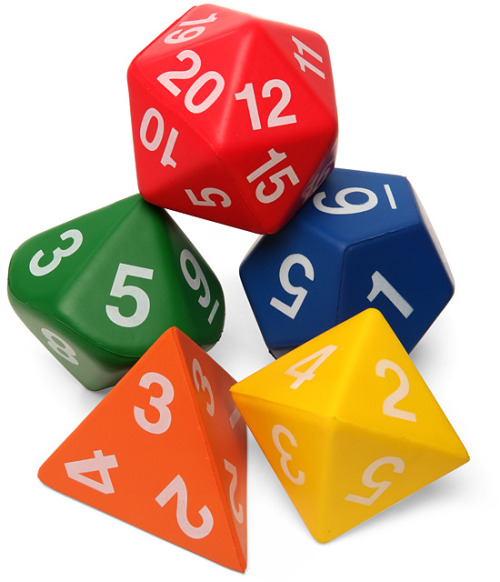 It has been a loooong time since I last rolled a d20.
It has been a loooong time since I last rolled a d20. Coincidentally, while we’re on the subject of tabletop gaming, another friend has recently started playing Magic: The Gathering, and he’s also started a blog to follow his progress. Magic’s something I have dipped my toes into but, along with Warhammer and the Pokémon card-game, I’ve discovered I’m simply way too cheap to keep buying booster-packs and cards to keep up with the competition. But that doesn’t mean I can’t enjoy the mechanics of the game from the sidelines, and Tap for Awesome is a good place to do it! It can be a monstrously complicated game, but Mark clearly lays it out so it’s not that hard to follow - give it a look if you’ve ever been interested. He’s threatening some comics-related posts in the future, too, so I look forward to those.
Coincidentally, while we’re on the subject of tabletop gaming, another friend has recently started playing Magic: The Gathering, and he’s also started a blog to follow his progress. Magic’s something I have dipped my toes into but, along with Warhammer and the Pokémon card-game, I’ve discovered I’m simply way too cheap to keep buying booster-packs and cards to keep up with the competition. But that doesn’t mean I can’t enjoy the mechanics of the game from the sidelines, and Tap for Awesome is a good place to do it! It can be a monstrously complicated game, but Mark clearly lays it out so it’s not that hard to follow - give it a look if you’ve ever been interested. He’s threatening some comics-related posts in the future, too, so I look forward to those.

